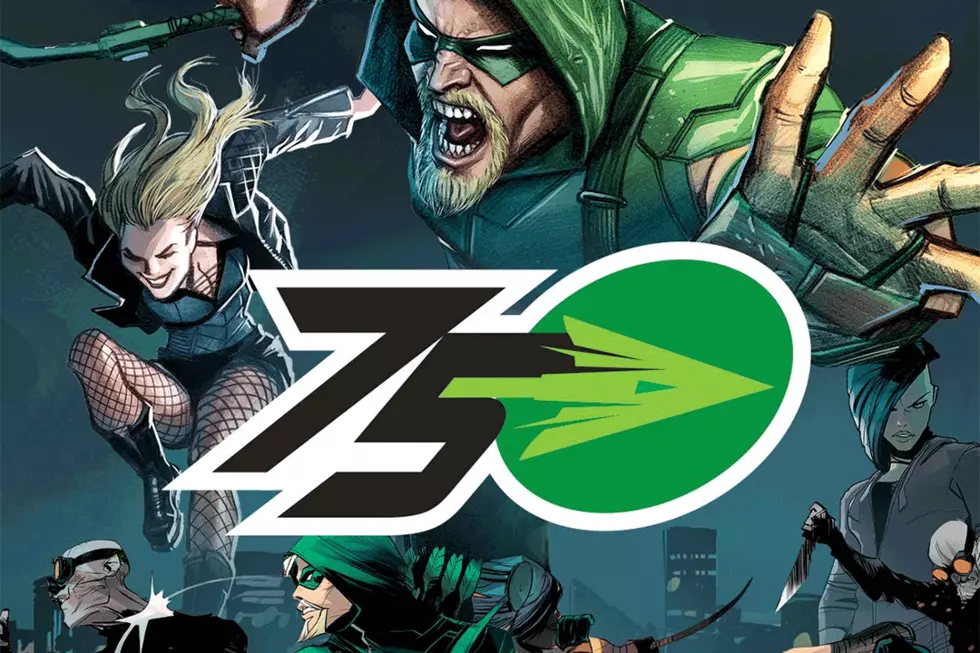![Brad Meltzer Explains How He Assembled ‘Heroes for My Son’ [Interview]](http://townsquare.media/site/622/files/2010/05/heroes-for-my-son-brad-meltzer.jpg?w=980&q=75)
Brad Meltzer Explains How He Assembled ‘Heroes for My Son’ [Interview]

A new book by Brad Meltzer hits the stands today titled "Heroes For My Son," a new prose collection where Meltzer has put together stories about the heroes who best exemplify the values and choices he wants for his son. And despite Meltzer's work in the superhero genre on comics like "Identity Crisis" and a recent run on "Buffy the Vampire Slayer," these are heroes of the real-life variety, ranging from Mr. Rogers and Jim Henson to Gandhi and even Meltzer's mom. ComicsAlliance talked with Meltzer about the experience of assembling his philosophy on life for his child, and what he hopes that everyone else can take away from reading it.
ComicsAlliance: Did you come up with this idea before your son was born, or did it come out of the experience of raising him?
Brad Meltzer: On the night that I was born, my dad went out and bought a bottle of champagne and said, "I'm going to open this someday on my son's wedding day." Which we did. And I remember when my dad actually lost his job, and I was a teenager and we moved down to Florida. What we had in the car -- it was almost like there was a fire and you only had whatever you could grab. And I remember in the back seat of the car as we drove, behind the headrest, were two bottles of champagne: one for me and one for my sister. And that was what they grabbed. It meant that much to them. I was always struck by that idea, and I felt like I was going to do it in the way that I know how, which is to tell a story. So eight years ago on the night my son was born, I said, "I'm going to write a book for him that's going to last his whole life. I'll give it to him and he'll think I'm a mad genius." [laughs] But the truth was, I was writing about fatherhood and I knew nothing about being a father.
And then someone told me this story about the Wright brothers, which was that every time the Wright brothers would go out and fly their planes, they would bring enough materials for multiple crashes. That means every time they went out, they knew they were going to fail. They would crash and rebuild, crash and rebuild. And that's why they finally took off And I loved that story. I wanted my son to hear that story, and I wanted him to know that if you are stubborn and if you have a dream and you work hard enough, you can do anything. That's when the whole book shifted for me and I realized that I was going to collect these heroes for him. I'd started the books with morals, like "be good," or "be nice to the fat kid in class," but I didn't just want to give him empty morals; I wanted to give him real proof that anything is possible.CA: How old is your son now?
BM: He's eight years old now, so I've been working on this book for almost a decade, which probably shows you how crazy I am.

CA: When are you going to give it to him?
BM: The funny thing is, I thought I was going to give him on his wedding day; I never thought I was going to do it when he was young. Then two years ago, my mom died from breast cancer. I can't say that I suddenly said, "oh my gosh, I now must complete this book." I certainly didn't have that emotion, but I don't think it's coincidence that I said, you know, it's time to put it together. I just felt like, why save saying I love you for some great moment when you could say it right now? I actually gave it to him when I got the first galley copy. It was bedtime, and this was the moment I'd waited for his whole life, where I would give my boy the book I'd prepared just for him. And basically, he doesn't care about Mr. Rogers or Jim Henson or Eleanor Roosevelt; he went right for the sports figures because he likes sports. He fought the first sports guy in there, [baseball player] Roberto Clemente.
The story is about how Roberto Clemente had heard about this earthquake in Nicaragua and sent three planeloads of food and medicine over there, and all three of them had been confiscated and all the stuff was stolen. Finally, he said, I'm going to go on the fourth plane myself, to make sure it gets there. Roberto Clemente gets on the fourth plane himself, and the plane crashes into the ocean killing everyone on board. As it says in the book, Roberto Clemente isn't a hero because he died; he's a hero because of why he got on board.
So now I'm waiting while my son's reading this aloud to me -- my words read by my boy. There are no more perfect moments. As he's reading to me, I'm waiting for him to tell me how inspired he is... and I feel him shrinking in my arms. I can feel the air leaving his lungs, and I realize in that moment that I scared him. He turns to me and says, "Dad, this is sad." And I thought, oh my gosh, the things that I planned -- it's the opposite of that." So the next night I didn't even approach the book; I just let it sit by the side of the bed, and he comes bouncing into the room, grabs the book, and says, "Who are we reading tonight?"
I said to him, "What about Roberto Clemente?" And he said, "I like Roberto Clemente." When I asked why, he said, "because he gave his life to help those people." And I realized in that moment that the only way you can teach about a hero is to be able to teach about something sad. You can only teach the high by teaching them the low. You can only teach about who a hero is if you teach why you need that hero.
CA: So the experience of giving it to him seems like it's been a lot more interactive than you expected.
BM: Part of the process of watching him react to it -- that's where I'm learning how to be a father. That's what I learned with the book. I didn't learn more about Lou Gehrig or Anne Sullivan; I learned how to be a dad. I learned what I wanted to teach my son. And even then, even as I presented it to him I learned something more from that.
I think this book became more than a book -- it's my dream. It's my philosophy. I could give you seven novels, or whatever else I've worked on and say, "read it and then tell me what you know about me," and I think you'd get bits and pieces of me. But you read this book, and this is it. This is my entire approach to life. I think are all strong and we are all weak and we are all brave and we are all cowards. We are all amazing and we are all awful -- some of us on the same day. But that's ok. I think it's taken me all these years of my life to finally realize that it's ok to be who you are. There's this great quote from Lucille Ball that in there. I think most of the heroes in the book are struggling with what I think most of us struggle with every day, which is accepting ourselves.
CA: I don't think people always imagine heroes as people who have insecurities or doubts, so it's interesting that it's a quality that you would play up.
BM: Well, I didn't want this book to be just about great people; I wanted it to be about the moment that makes them great. I wanted them very to be people again. These people are all icons: Charlie Chaplin, Lucille Ball, Martin Luther King Jr., Rosa Parks. But we turn these people into caricatures, symbols -- these things we love but we don't really even know why. I like coming back and finding the core moment. I love finding that Anne Sullivan risked her own eyesight to teach Helen Keller how to read. The doctors warned her that if she kept reading to this girl, she could lose her eyesight. And she said, I don't care... Finding that little detail or nugget that people don't know is often what's important.
Thomas Jefferson is not in the book because he wrote the Declaration of Independence; he's in it because he never bragged about it or took credit for writing it while he was alive. The guy ran for President, but never got up there and said, "guess what everybody, I wrote that thing, one of the greatest documents in Western Civilization -- that's mine." Imagine any politician today having that kind of humility?I want my son to learn this lesson...
My first writing that I did was actually as a writer for Americorps, the president's national service program. I co-wrote the oath that people have to raise their hand and say to be sworn in. The last two peoples of the book are blank. They say, "Hero's Story Here" and "Hero's Photo" here. I think they're the two most important pages in the whole book, because I can't wait to see what people put in those ages.
CA: How far are are you into the book?
BM: We're about 80% done at this point. And I let him pick. The front of the book -- you don't read it cover to cover; you pick out a different hero every night, We've done the sports heroes, and most of the presidents, but he of course is holding out because he doesn't want to read about any of the women. Someone asked him who he liked in the book, and my son said, "George Washington." And I kind of had that proud dad moment because he picked George Washington. And then the person asked him why, and he said, "Because he could have been king, but he decided not to be," which is the exact story in the book. It's not that he didn't tell a lie, or that he was the world's greatest man, but he could have been the king of the United States and taken all the power, and he didn't. He actually had faith in us as people. Why would we love someone just because they're the first president? There's no good reason. There's nothing I can relate to my own life in that. But tell me what he gave up, and I'll show you the man.
CA: Is this going to be the end of the project, or could you see yourself continuing it in another installment somehow later?
BM: Well, I'm working on one for my daughter now too. I couldn't do just one of them. And I will say this, she comes in my office everyday and asks, "Is my book done yet? She's worse than my editor. Actually she wanted to make a book recently, so we made a little book and I helped her put it together -- it was about this dog that she likes. So she's putting the title and the author on it, and as she's about to add "Dad," she looks up at me and says, "Nah, I think I'm going to have to do this one myself." My daughter just cut me out of the deal like a Hollywood executive. [laughs]

More From ComicsAlliance


![Chip Kidd: Remixing Batman And Designing Super-Solutions [Interview]](http://townsquare.media/site/622/files/2014/08/Untitled-130.jpg?w=980&q=75)
![DC’s ‘Batman: A Celebration Of 75 Years’ Collection Actually Lives Up To Its Title [Review]](http://townsquare.media/site/622/files/2014/07/Celebration01.jpg?w=980&q=75)





